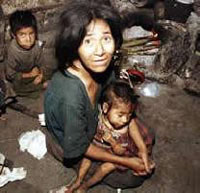Poverty won't be defeated in Asia by 2015

It’s unlikely that an ambitious program to reduce poverty and provide adequate social services for all citizens by 2015 will come true in the Asia-Pacific region.
While progress has been made on combating poverty, it has been coupled with a troubling increase in economic inequality, said the report on the U.N.'s Millennium Development Goals.
However, the number of people living in extreme poverty in the region is likely to be cut in half by 2015, it said.
The region - home to 60 percent of the world's population - had more than 1 billion people living on less than US$1 (EUR0.70) day in 1990, but that number has now dropped to 641 million, said the report, jointly produced by the Asian Development Bank, the U.N. Development Program and U.N. Economic and Social Commission for Asia and the Pacific, ESCAP.
China has made the biggest headway, with one in three Chinese living in poverty in 1990, compared to one in 10 today, the report said. But other countries were lagging behind, among them the Philippines, India, Bangladesh, Pakistan and Sri Lanka.
Increases in economic inequality may loosen social cohesion and lead to social or political instability, undermining the achievements of the goals that are met, said the report "The Millennium Development Goals: Progress in Asia and the Pacific 2007."
The Asia-Pacific region is on track to reduce extreme poverty, attain universal education and achieve gender parity. The biggest failures to date have been in reducing child mortality, improving nutrition and maternal health, and providing safe drinking water and sanitation facilities, the report said.
"Not one single country is on track to achieve all of the targets," said Pietro Gennari, chief of the statistics division of the ESCAP.
The Millennium Development Goals, or MDGs, are targets adopted by world leaders in September 2000 to promote development and health care in the world's poorest countries.
In many countries, the poorest 20 percent of the population have seen their share of national income drop steeply and economic inequality has risen in 14 of the 20 countries in the region, the report said. Nepal and China experienced the largest increase in income gaps.
"Despite the double digit growth numbers, it is not reaching large pockets of the population," Raj Kumar, an ESCAP official, said at a news conference.
The overall aim should be to reduce poverty while improving the delivery of basic services through expanding physical and social infrastructure, said the report. But some countries, particularly the region's least-developed countries, do not have the funds to meet these investment needs.
Subscribe to Pravda.Ru Telegram channel, Facebook, RSS!


